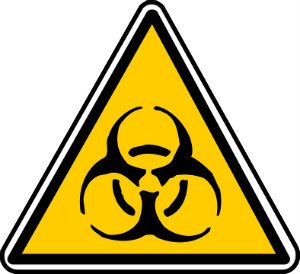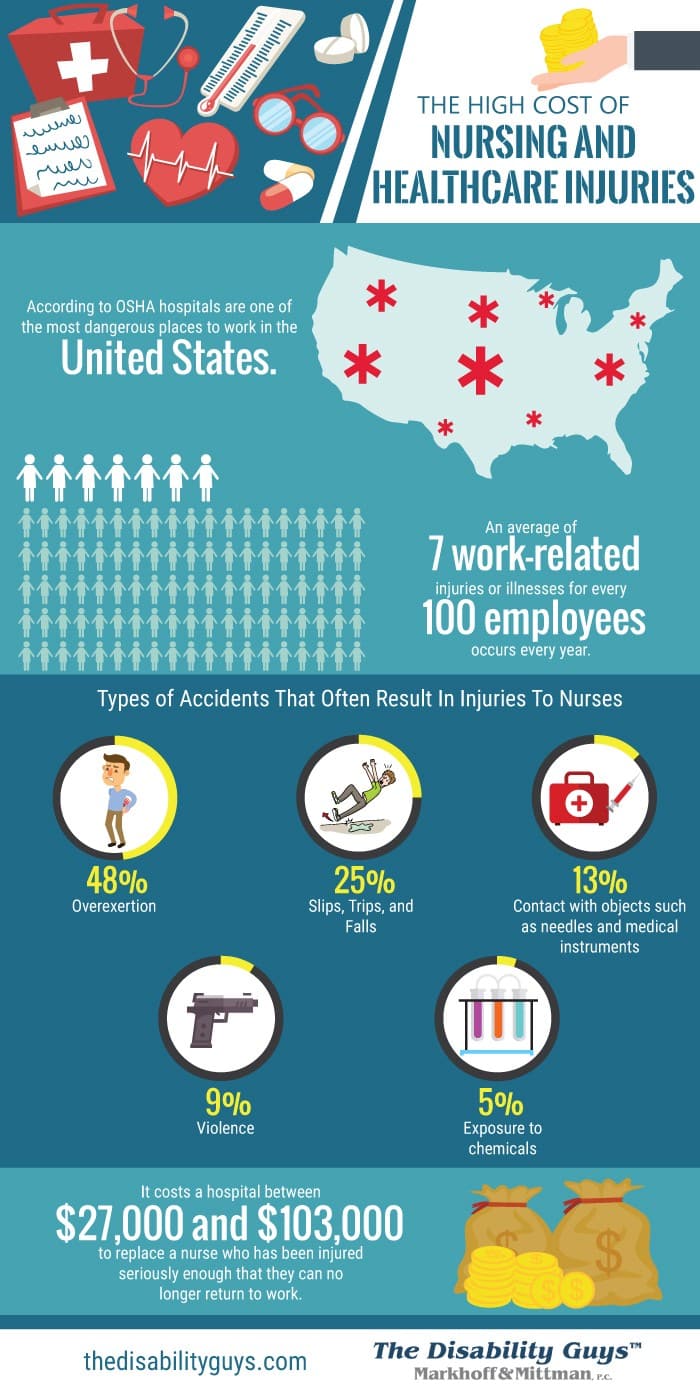Nurses are arguably some of the most compassionate and caring people on the planet. Not only do they work hard each day taking care of patients and assisting doctors, but they are often the person that patients receive comfort from. However, nurses frequently find that they become the patient after they are injured on the job.
Nurses usually enter into a medical career because of their desire to help those who are injured or ill. But who takes care of the nurses when they suffer injuries on the job?
A Unique Culture: Putting The Patient First
Nurses are often so focused on patient care that they continue on with their work, even when they themselves are suffering and in pain. Unfortunately, this dedication means that in many cases, the nurse doesn’t get the care that they need.
This was the case for one nurse who was helping to lift a 300-pound patient who had fallen. While helping to get the patient back in bed, she felt a “pop” in her back. Putting her patient first, she continued to work the entire shift despite growing back pain.
Hours after her shift had ended, her husband found her on the floor of their bedroom, unable to walk. She now has a plate and several screws in her spine due to a herniated disc that occurred while she was lifting the patient. She is unable to return to her job because of the severity of her injury.
Facts About The Dangers Of Nursing
Nursing isn’t just about handing out medications and changing sheets. The fact is that nurses are exposed to wide variety of dangerous situations on a daily basis. This typically includes:
- Exposure to infectious diseases through patient contact or contact with needles and other materials used by patients. Of these diseases, Hepatitis B is the most commonly contracted infectious disease by workers.
- Exposure to toxins such as ethylene oxide which is commonly used to sterilize instruments.
- Exposure to radiation. Any nurse who routinely works with patients undergoing x-rays can be exposed to high levels of radiation if not given the correct protective equipment or if the x-ray machine is malfunctioning.
- Violent attacks. Sometimes, while suffering from certain medical conditions, patients become confused and afraid. As a result, they can lash out at those who are trying to care for them because they believe that they may be in danger.
- Over-lifting. The human body can only do so much and while many nurses are very strong, it is easy to become injured while lifting any heavy object.
Injuries Commonly Suffered By Nurses
Musculoskeletal Injuries
Nurses frequently suffer from back, wrist, shoulder, knee, and ankle strains while lifting patients, or during a slip and fall accident in the hospital. In some instances, they suffer even more severe injuries like damage to the vertebrae which can mean even young nurses are unable to return to their job.
Sadly, nurses often become the victims of violent crimes which can also result in an injury to the musculoskeletal system. Not every patient is willing, particularly those whose mental state is altered due to illness or injury. During the course of treatment, many patients become scared and lash out, not realizing that they have injured those that are trying to help them.
Infections
Patients are often hospitalized with severe bacterial infections. Exposure to this bacteria can lead to serious skin infections, blood infections, and respiratory infections.
Needlesticks
Needles are used to administer drugs, draw blood, or place catheters. Whenever a nurse is pricked with a needle that is no longer sterile, there is a risk of exposure to any communicable disease or infection that the patient the needle was previously used on may have. The nurse may have to return several times over a period of months for testing to be sure that they aren’t ill.
Chemical Exposure
Nurses are exposed to numerous hazardous chemicals during their shift. In a study performed by Physicians For Social Responsibility named “Hazardous Chemicals In Health Care: A Snapshot of Chemicals in Doctors and Nurses”, researchers discovered that all of the participants had “at least 24 individual chemicals in their body”.
The study concluded that hospitals and employees must work together to:
- reduce exposure
- protect the patient, nurses, and doctors
- participate in governmental and institutional programs
Any one of these injuries can require thousands of dollars in medical care, turning nurses into patients.
The High Cost Of Nursing Injuries
Statistics have shown that the average workers’ compensation claim payment for nurses is $15,860. That doesn’t include the money that is lost in wages by nearly 25% of all injured nurses who require sick leave in order to heal. It also doesn’t address the nearly 50% of all nurses whose workers’ comp claims are completely denied, and who are left to fend for themselves.
In fact, it is more financially beneficial for hospitals to work at preventing nursing injuries then it is to replace those who are unable to return to work. If the injury the nurse sustains is career-ending, it costs the hospital an average of $27,000 to $103,000 to replace them.
Considering the large amounts of money that injuries to nurses cost hospitals every year in both insurance premiums and replacement costs, many wonder why more money hasn’t been invested in training and equipment that would help prevent many from being hurt.
Infographic: The High Cost Of Nursing And Healthcare Injuries
Share this Image On Your Site
Options Available For Nurses Who Have Been Hurt
The first question most nurses who have been hurt on the job ask is “How will I pay for my own medical bills?”. In most cases, the injured nurse has two options:
File For Workers’ Compensation
Workers’ compensation insurance is required by law for most employers. This insurance exists to protect both the employer and employee. Once a claim has been filed, the employee is prevented from pursuing a lawsuit against the employer. In return, the insurance company should cover the costs of any medical treatments relating to the injury sustained.
File A Personal Injury Lawsuit
Even though an injured employee can’t file a personal injury lawsuit against their employer, that doesn’t mean that there isn’t another party whose negligence resulted in the accident that caused them harm. A personal injury lawsuit can cover the full loss of wages and may even compensate the victim for other losses such as pain and suffering.
Why Consult An Attorney?
Many believe that filing for workers’ compensation will be enough to cover their losses. They also believe that the process of filing this claim and then receiving the compensation will be easy and 
So many nurses have been denied the compensation they need that NPR has done several reports on the problems faced by healthcare workers, including one which told the story about a nurse, who after more than 20 years of working from the same hospital, became seriously injured while lifting a patient.
“The second she [the patient] grabbed on, almost instantaneously I felt like hot tar was just going down my spine and into my butt.” reported the nurse. She also indicated that by the time she got home, her husband had to carry her into her house. The very next day she reported the pain in her back to her supervisor. Within a few months, she needed to have a surgeon perform a lumbar interbody fusion during which a plate cage was placed on her spine to stabilize it. As she was recovering in her hospital room, an HR rep from the hospital walked into her room and handed her a job termination notice.
The hospital then contested her claim, stating that she had actually hurt her back while lifting a casserole out of the oven. She had to take them to court in order to get the compensation that she deserved.
Sadly, this nurse’s story is not unique and every day, nurses find that in order to get what they so desperately need, they have to consult with an attorney who can defend their legal rights.


